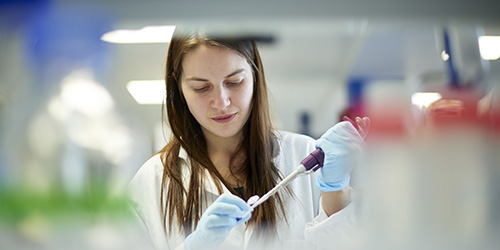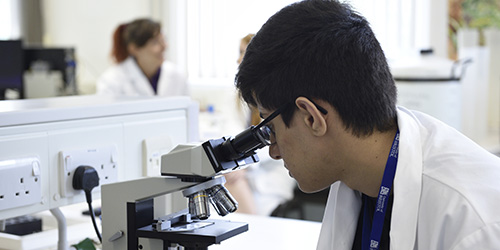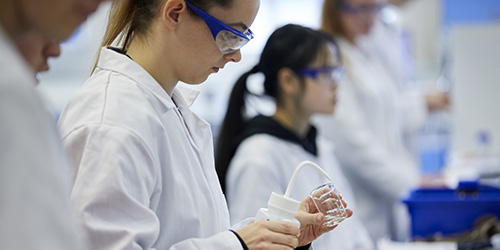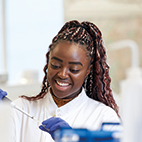Biochemistry
Our courses will give you a unique insight into life at a molecular level and prepare you for a career in any of the major biosciences.
Student satisfaction
Our School of Biochemistry scores highly in student surveys, receiving 95% overall satisfaction in the National Student Survey 2022.
Learn at the cutting edge
Join a community of experts working on groundbreaking research into the molecules of life - from antibiotics to SARS-CoV-2.
Leading department
We are in the UK top 10 for Biological Sciences (QS World University Rankings by Subject 2024).
Biochemistry courses for 2025
Single Honours
- BSc Biochemistry (C700)
- BSc Biochemistry with Medical Biochemistry (C720)
- BSc Biochemistry with Molecular Biology and Biotechnology (C790)
- BSc Biochemistry with Study in Industry
- MSci Biochemistry (C701)
- MSci Biochemistry with Medical Biochemistry (C721)
- MSci Biochemistry with Molecular Biology and Biotechnology (C791)
Biochemistry at Bristol
Biochemistry is a broad discipline with the ultimate aim of understanding life's processes at a molecular level. It encompasses:
- the chemical nature and structure of biological molecules and how they interact with each other;
- complex cellular reactions and the generation of energy to power cellular activity;
- communication and coordination within and between cells;
- the replication, expression and repair of genetic material.
Our teaching is informed by a wealth of wide-ranging and cutting-edge research. The school's research groups investigate some of the major challenges in modern biochemistry using problem-solving approaches ranging from a detailed examination of biological processes at the level of single molecules, to exploring the complex organisation of cells and whole organisms.
Everything in our school is under one roof, including our café, library, and student support, so you'll find everything you need to excel and feel part of our welcoming community.
We also offer Biological Sciences, Biomedical Sciences, Cellular and Molecular Medicine, Neuroscience, Pharmacology, Physiological Science and Psychology.
Bristol has a very inclusive community - in my faculty, pretty much everyone knows everyone, and all the lecturers are very easy to talk to. If you don't understand something, your lecturer can answer in depth because they're working on that specific research.
Career prospects

Biochemistry graduates forge careers in a broad range of scientific and related disciplines, such as in the pharmaceutical and biotechnology industries, medical and agricultural research establishments, as well as the scientific and medical publishing sectors.
More than one-third of our graduates undertake further training and gain a higher degree in biochemistry or a related science, or go on to study in areas such as medicine.
We provide dedicated transferable and employability skills training on all biochemistry courses and you'll receive career-specific support and guidance, including careers events and advice on developing your CV, applying for internships and preparing for interviews.
Our graduates also enter professions such as teaching, law, finance and other non-scientific careers.
Course structure

Each of our three-year biochemistry BSc courses includes the option of transferring to our research-intensive, four-year MSci.
During your first year, you will receive a comprehensive introduction to the subject through biochemistry and biological chemistry units. You also have a choice of other units, dependent on your degree pathway.
In your second year, you will study biochemistry and molecular genetics units, as well as gain research, employability and enterprise skills, and take optional units.
The final year of our BSc degrees comprises core lectures in advanced biochemistry and the opportunity to study specialist areas. You will carry out an original research project and undertake a final-year literature project on a specialist area of biochemistry.
MSci students follow a similar third year to the BSc final year but will undertake a research training module in place of the research project. In the fourth year, you will study core and optional units and carry out an extended research project.
Units may include:
- Gene Expression and Rearrangement
- Recombinant DNA Technology
- Science and Society
- Protein Assemblies and Molecular Machines
- Molecular Basis of Disease
- Cancer.
Practical experience

You will learn through lectures and practicals, as well as small-group tutorials where you can give presentations and develop transferable skills. Practicals in our well-equipped teaching laboratories allow you to develop your experimental skills.
Our commitment to teaching innovation includes eBiolabs, our interactive lab manual, which will help you build confidence, learn at your own pace and try out virtual experiments as you prepare for upcoming lab sessions.
Choose our Study in Industry option to spend your third year in a full-time research placement, often paid, in the pharmaceutical or biotechnology industries, or at a research institute in the UK or overseas. Recent placement destinations have included GSK, Pfizer, AstraZeneca, Procter and Gamble, Kyushu University and the Max Planck Institute.
